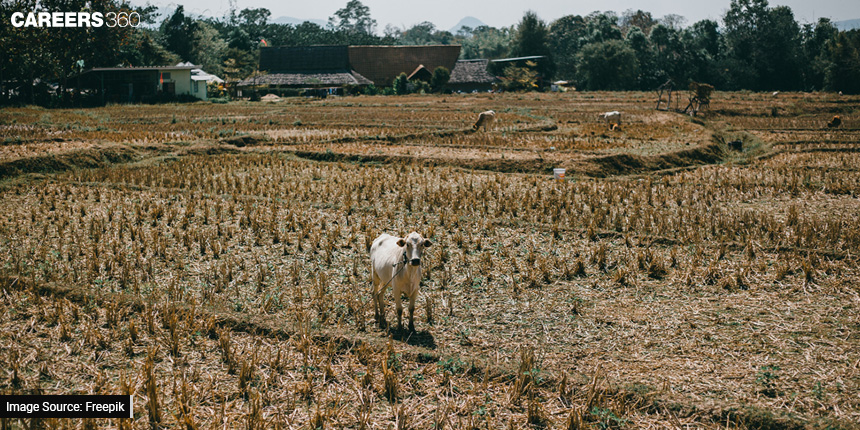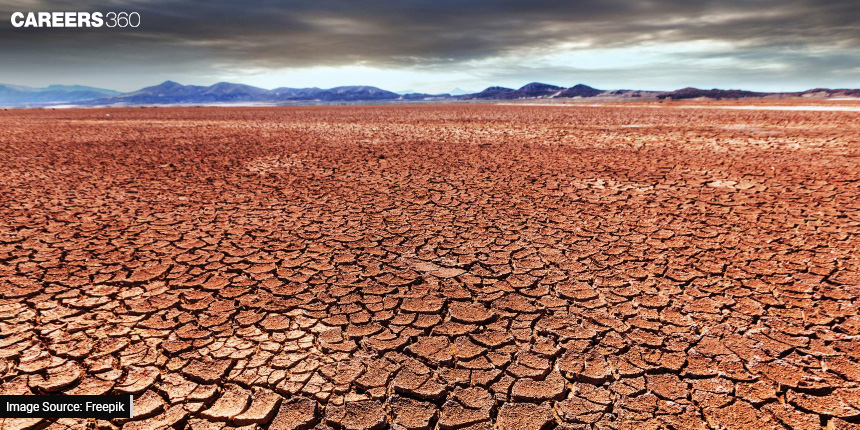Scarcity Of Water And Its Impact On Crop Production
Plants are the basis of life on our planet, as they are the only autotrophs that can utilise the sun’s energy and prepare their own food. They use environmental factors like air, water, and solar energy to grow and produce fruits, flowers, and vegetables that are later consumed by all the other species on Earth.
This Story also Contains
- Water Requirement for Crop Production
- Causes of Water Scarcity
- Common Causes of Water Shortages
- How Does Water Shortage Affect Crop Yields?

Crop production, growing and cultivating different varieties of plants, including all types of fruits, vegetables, cereals, pulses, and more, for domestic and commercial purposes on a large scale. Agriculture, or farming, is an integral part of the world as it enables the population to obtain food for themselves.
Experts have proposed that climate change and agricultural water scarcity have the potential to damage 80 per cent of croplands, as almost 60 per cent of these croplands will have no water supplies by 2050.
Also, Read | Osmoregulation In Terrestrial Animals: How Does Water Excretion In Animals Occur?
Water Requirement for Crop Production
The process of farming is a hectic and long one. It requires multiple resources and a certain time period. Crops do not grow overnight and require proper maintenance and care. One of the most essential factors in proper crop production is water, which is required continuously for the conduct of optimum physiological processes in the plants. This is because water influences almost all the processes occurring in plants, like photosynthesis, respiration, translocation of nutrients, and many others.
Water management becomes an important practice in crop production as, along with quantity and quality, it is also necessary to maintain the drainage system. Poor or excessive quantities of water can disrupt the soil or cause soil erosion, making it unfavourable for crops.
Water influences crop production in such a way that crops are grown according to water availability in different seasons. For example, some crops like maize and sugarcane are known as Kharif crops and are grown in the rainy season due to their heavy water demands and other weather requirements.
On the other hand, crops like wheat and peas are grown in the winter due to lower water requirements and are also known as Rabi crops.
Causes of Water Scarcity

Agriculture demands a good percentage of water, as it has been observed that optimally irrigated land will yield better results than rainfed land. Relying only on rainfall can influence the final results, as nobody can depict accurate weather conditions. Recently, there have been dramatic seasonal changes, and hence, properly irrigated land will yield better crops.
Now we know that the population is rising, urbanisation, industrialisation, agriculture, and other essential sectors are also rapidly increasing. However, we have limited water resources. Due to this, the demand for water is on the rise and will keep on increasing. As for the population explosion, agriculture, urbanisation, and more will expand, thereby increasing the water demand to unexpected levels.
Water scarcity is a condition where a lesser quantity of water is present than required. Due to the shortage of water, the demands cannot be met, which implies adverse effects on almost all sectors.
Also, Read | Does Early Onset Of Puberty Affect Individuals Over Time?
Common Causes of Water Shortages
There is no denying that water scarcity can negatively impact almost everything, but do you know that this scarcity is due to the increased population explosion, agriculture, and urbanisation alone? Agriculture can be greatly impacted by water shortages, but mishandling or inefficient drainage of water is one of the leading causes of water scarcity.
The changes in precipitation and temperature across the globe have ignited changes in water availability. Due to this dimension, the agriculture sector is ruined, and thus there could be threats to global food security.
With an increased population and readily available resources due to technology, people have grown careless, and water waste has increased considerably.
How Does Water Shortage Affect Crop Yields?
Insufficient or inconsistent rainfall is expected to cause a water shortage as rain is the source to replenish the groundwater, but if that does not happen, the groundwater will soon decline, causing disruption in the absorption of nutrients and water by the crops.
Farmers would not have sufficient water quantities, and hence irrigation would be interrupted. This will cause inconsistent irrigation of the crops, and hence their yields will be affected.
The absence of water will affect fast food production, which is done to feed the fast-growing population. Along with the quantity, the quality will also be compromised as crops have a fixed water content, which will not be sufficient.
Due to water scarcity, the crops will be weak. The physiological processes will not be optimal, and thus these weak crops could be hoarded with diseases, pests, and more.
Low water quantities will affect the soil quality, as the soil has an optimum composition.
To ensure food security, improved agriculture practices, and better living, ways must be adopted to conserve water and practise sustainable methods in agriculture. The irrigating methods must be efficient so that water is not wasted and is used mindfully.
Also, Read | Amazing Facts About Eating Habits And Weird Food Habits Of Some Animals
Applications for Admissions are open.
As per latest syllabus. Physics formulas, equations, & laws of class 11 & 12th chapters
JEE Main Important Chemistry formulas
Get nowAs per latest syllabus. Chemistry formulas, equations, & laws of class 11 & 12th chapters
JEE Main high scoring chapters and topics
Get nowAs per latest 2024 syllabus. Study 40% syllabus and score upto 100% marks in JEE
JEE Main Important Mathematics Formulas
Get nowAs per latest syllabus. Maths formulas, equations, & theorems of class 11 & 12th chapters
